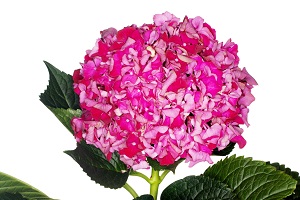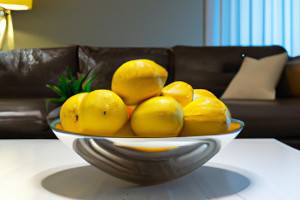The persimmon fruit has an orange appearance that is somewhat in between an orange and a tomato.
Other than being an exotic tasty fruit, it also carries a lot of symbolism when they are displayed at home for feng shui.
The Chinese name for the persimmon is shi (柿) which sounds like 事 that relates to business affairs and matters.
It sometimes goes by the name Chinese fig or date-plum.
The fruit is therefore a fortune symbol meant to convey business success and career advancement to receivers. But take note that this is applicable to round shaped persimmons. This needs to be emphasized as this fruit can sometimes come in odd shapes… even squarish.
As a plant, the persimmon plant carries the symbolic meanings of kindness and longevity.
The persimmon tree is said to have 4 virtues.
- Longevity
- Shelter for birds
- Home for birds
- Free from parasites
This multi-faceted symbolism of persimmons makes it one of the popular fruits that people have in paintings and decorations for display. Even using the real fruit itself.
However, a lot of people have them on artwork for display without realizing that they are persimmons!
They think that they are oranges!
A lot of gardeners actually love to care for their auspicious persimmon plants in the yard as they bring a flavorful aroma to the space.
On top of that, the bright colors of the fruit add more vibrancy and cheerfulness to the garden.
On the Autumn festival which falls on the 15th day of the 8th month, this is a popular item used as offerings.
When displayed with mandarin oranges, they represent a wish for one’s success in business ventures with good business luck in all undertakings.
They are meant to convey the same meaning with profits when displayed with lychee. This is especially so for trading businesses.
They are also sometimes paired up with magnolias and lingzhi to bring in other positive symbolism. But the main purpose is still a wish for business success that is everlasting. The magnolia can sometimes be replaced with lilies.
Paired with lilies alone, bonsai or cypress, it signifies success in your pursuits.
With the sacred lily, it has the same meaning as generic lily, but a thousand fold. When fungus mushroom is added in to become a trio, it means success no matter what you undertake.
When pictured with apples, it symbolizes contentment with success.
When persimmons cake is depicted with pine trees and oranges, it means to communicate good luck with a hundred undertakings.
With lychee, it means profitable business dealings.
Display products often depict the persimmon with the ru yi. This represents a wish that everything would go smoothly and is a popular gift to others on joyous events and festivals. The ruyi can sometimes be replaced by lingzhi since the latter is commonly depicted on the head of the former.
A popular painting arrangement showing a crow with 6 persimmons is a representation of masculine elegance.
Feng shui placement
Because the persimmon fruit is mostly associated with business success, they are often found on display with other auspicious fruits as framed pictures in office premises.
They are frequently seen in meeting rooms where business owners make deals with others, and the personal office of the owner.
It could also be a good addition for a boiler room if your business has one.
At home, they are most appropriate for the living room, work area, study, and other common spaces.
They are appropriate items for the wealth corner, especially where sheng chi is located.
If you are a female business owner, then it would also be appropriate to hang a painting of persimmon at the southwest as that is where the Kun trigram resides.
If you don’t want to have them on the wall in the form of paintings. consider putting them in a bowl together with other auspicious fruits and place them at the dining table or coffee table for display.
Whatever you do, keep them out of the bedroom or your would never be able to get quality sleep as you’d be dreaming of doing business all the time.















